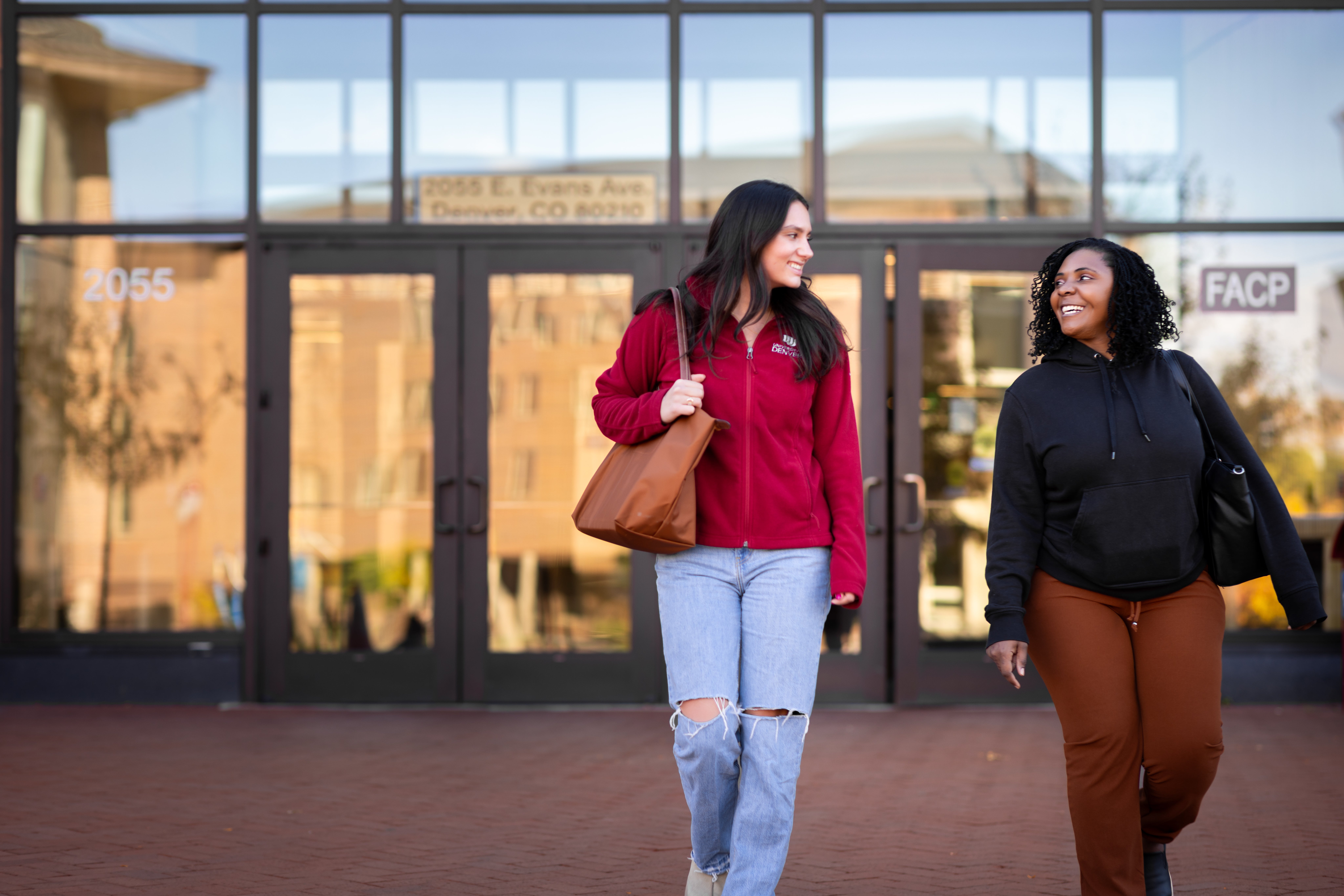A Special Take on Special Education in Colorado
What can the State of Colorado do to improve the educational experience for individuals with differences? How can parents of children with special needs be empowered more effectively? To find out answers to these and other questions, we sat down with Stephen Fusco.
Stephen, who plans to graduate in June with his PhD in Educational Leadership and Policy Studies at Morgridge, was recently appointed to the Colorado Special Education Advisory Committee (CSEAC). The committee provides policy guidance to the State on issues relating to special education. CSEAC is mandated by both state and federal law. Representatives include parents of children with special needs, service providers, and other members of our community. As we started out conversation, Stephen voiced concerns that many in our community have expressed, saying that he was “surprised at how little attention children with special needs still receive,” especially in Colorado. This is one of the reasons why he wanted to participate in CSEAC. Representatives can not only participate in critical advocacy for children, but also inform important decision-making at the state level.
Our Interview
Let’s talk about coronavirus. The current situation has caused significant concern among some special needs parents and advocates in the context of education. While the fear of “losing ground” certainly weighs heavily on a lot of parents’ hearts, practical and legal issues abound. Some Colorado parents of children with special needs have expressed concerns that the use of virtual or remote learning is, in and of itself, a violation of FAPE. Can you share your thoughts on the interaction between coronavirus restrictions, remote learning, and FAPE?
As Stephen let us know, “FAPE is about the services offered to students. Those services are determined by an [individualized education program/plan or] IEP.” To the question of whether a “school district is providing the services that [a specific] IEP calls for, ” he said, “that is hard to say. Families should look at what is called for in the student’s IEP and compare that with what the school district is providing.” Thanks to potential legal issues related to this topic, we’d like to pause to note that nothing mentioned in this article should be interpreted as legal advice or an endorsement of any legal actions.
Some local parents have found variable in-person coronavirus restrictions (like the prohibition of equipment like CPAPs in a classroom setting) to be problematic. Others have worried that required screen time for remote learning could be detrimental to children who, as an example, experience seizures with prolonged display use. What, if anything, do you think that the State of Colorado could do to improve the provision of special needs education during these challenging times?
“A couple of things come to mind. The state needs to provide concrete guidance and ensure compliance with applicable special education rules and regulations… [and] there needs to be more funding for special education services. The State of Colorado needs to provide more money specifically earmarked for kids with special needs.” On the topic of funding, Stephen let us know that two considerations are particularly important: targeted or individualized funding and flexibility regarding the spending of funds. As he pointed out, each child is unique and every child deserves the educational services, equipment, and supports that “they need to be successful.”
You’ve mentioned the importance of IEPs. In the status quo, though, many IEP meetings are being held virtually and may include professionals who have never even met the children they are meant to support. Is there a solution to this issue?
“You always want the professionals with the most direct knowledge of the child present. Parents have the right to ask that those who have the most direct knowledge be present. No one should be making decisions about a child without that knowledge – no matter what the setting.” Stephen went on to explain that, in addition to parents having the right to request the participation of those with the most understanding of their child’s experience and needs, alternative modes of participation may be available. As an example, if someone familiar with a child’s needs is unable to attend a virtual meeting, they may be able to provide a written report.
For many parents of children with special needs, the reality of “parent as para” has resulted in significant challenges (including job losses). As parents increasingly fill the roles of therapists and others for their children, what role do you think the state should or could play in providing guidance, resources, or even compensation to parents?
“It’s hard enough to be a parent” and, for parents of children with special needs, “this role can be even more intensive.” Parents “should not be expected to fill the role of an educator or paraprofessional… they should not be burdened in this way.” As many would likely agree, “it is very difficult to play the role of parent and educator.”
In addition to the potential strain placed on parents who must take on one or several new roles in the context of their child’s education, Stephen let us know that this reality can also be problematic for educators and other professionals. When the roles of these individuals, who often have years of highly specialized education and experience, are adopted by necessity by others, it can create a cascading disservice. In addition to being problematic for parents, “it dismisses the trained professionals as if anyone could fill these roles, which is untrue.” While there may not be an answer to the “parent as para” problem, Stephen noted that the State could provide “additional guidance, training, and information.”
A lack of in-person education may translate into a lack of interventions, difficult IEPs, and delayed or absent evaluations. Do you think that the potential delays experienced by children and their families will have long-term effects on their outcomes?
“There is no doubt that Covid-19 is going to have long-term educational implications for all students. There are probably more significant concerns for students with disabilities.” The potential for more concerns for children with special needs stems, in part, from an important element of the special education model: one-on-one attention. This is necessarily highly personalized and geared towards helping “address achievement gaps” and the needs of each student. It is, ideally, something that all students should receive. Without this, and other critical educational experiences during the pandemic, “there will be significant repercussions that we can’t even understand yet.”
Evaluations include a “body of evidence.” Typically, “standard suites of assessments” are an important component of evaluations. Some have suggested that assessments cannot be completed (or must be delayed) due to the pandemic. Stephen explained that this is a “cop out.” Students can be meaningfully assessed using other sources of information. Teachers, he noted, ”can assess whether a child may have special needs” even in the absence of formal assessments. A teacher’s perspective, informed by their education, professional experience, and interactions with a child is invaluable. Observations by parents and other informal assessments can also contribute critical data. “Teachers and parents need to get creative – what is an evaluation? It is not just a standardized test.”
So, Stephen, what do you hope to do? What issues are on your mind?
“One of the things missing from the conversation is the importance of transportation to educational outcomes. If you look at the past year, there’s a whole group of students we’ve lost because technology wasn’t available and we don’t know how to get education to them. If we could get those students to an educational provider, then what changes could we have seen for that group of kiddos? No one is talking enough about the link between transportation and educational outcomes.” These outcomes are not specific to children with special needs. An example provided by Stephen was children experiencing homelessness. If children move (to a hotel, shelter, or other temporary accommodation), or have no fixed home, “transportation could ensure they get to stay at the same school.”
“What doors could we open for these extremely forgotten children? My hope is that people begin to look at transportation as a service that is as important as any special education service in a classroom. It is directly related to how well or successful that student will be. Let’s talk about what transportation means and how we can do it differently.”
Resources for Parents and Community Members
- Individualized Education Programs or Plans (IEPs) -
-
- AdvocacyDenver is a non-profit civil rights advocacy organization serving children and teens with disabilities and adults with developmental or intellectual disabilities and their families. They can provide expertise and direct support.
- For more information on parental rights in the IEP process, you can visit the State’s Individualized Education Programs (IEPs) resource, Ability Connection Colorado (for a comprehensive list of IEP tools), and PREP Parents for FAQs
- State special education guidance - If you would like information on the current guidance provided by the State, including disability-specific information, visit COVID-19 and Special Education. In addition to activities and other resources, the State provides virtual meeting information for various topics.
About Stephen
Stephen Fusco holds a Bachelor of Arts in Political Science, a Juris Doctorate, and a Master of Education in Behavioral and Learning Disabilities. His professional roles have included Vice President of Policy and Research at A+ Colorado, Educational Advocate and Pro-Bono Attorney with Advocacy Denver and The Center for Special Education Law, and Deputy General Counsel with Denver Public Schools. He currently serves as corporate counsel for HopSkipDrive. Recent publications include Access to Mental Health Services in Denver Schools: Recommendations for Mental Health Funding in DPS , COVID-19 Learning Loss: Recommendations to Improve Student Outcomes During COVID-19 Pandemic, and Colorado School Districts: Initial Response to COVID-19.
A quick disclaimer: none of the viewpoints or opinions expressed or inferred herein should be interpreted as legal advice. All questions, and their answers, are personal and do not necessarily represent the views of the Morgridge College of Education or the University of Denver.



